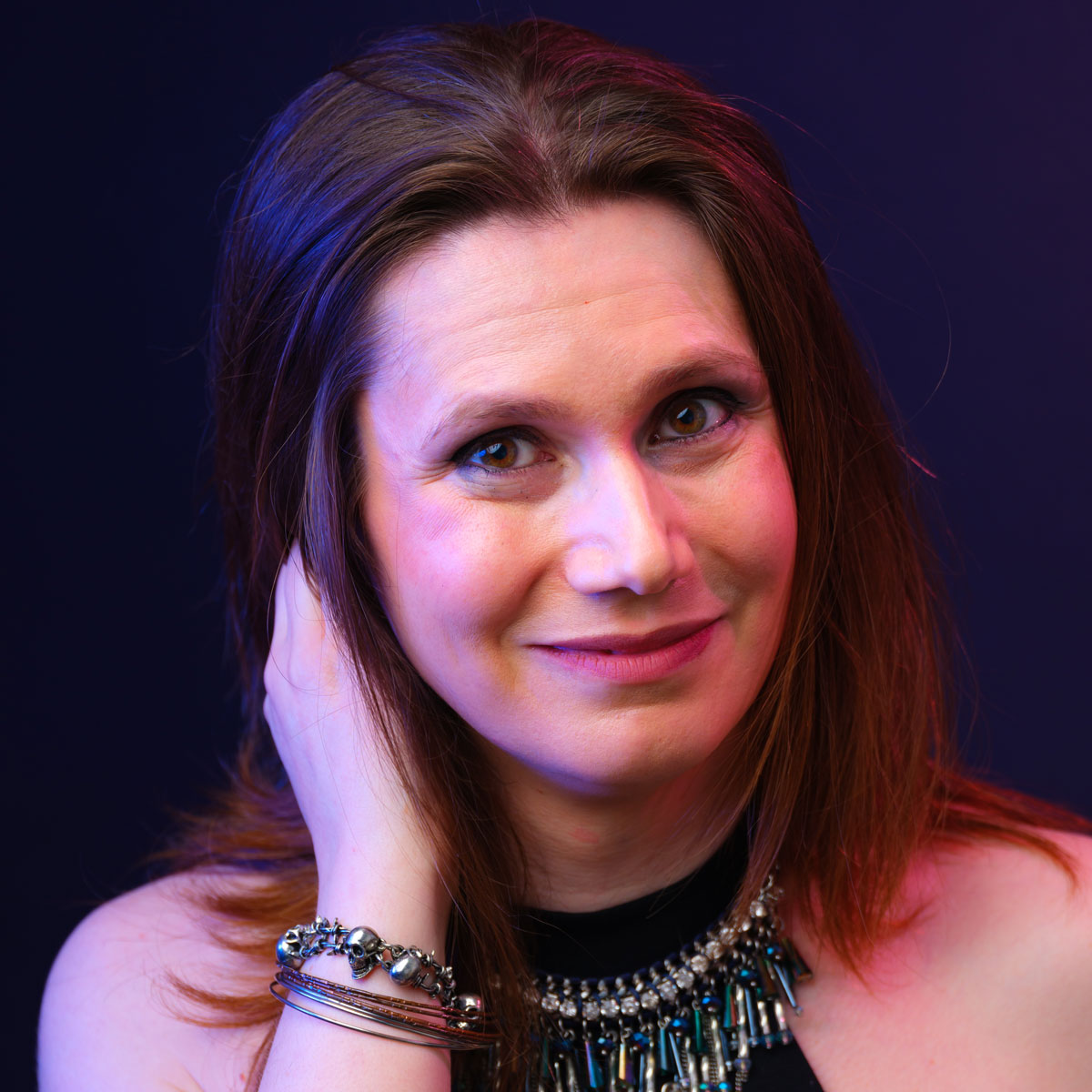Yvette Young: “I’m really optimistic about the future of guitar. It’s being used in a creative way and people don’t know all the cool sounds you can get from it”
One of the most original guitarists on the planet, combining innovation with accessibility on a new Covet album, Catharsis, Young explains why she’s the virtuoso who just “fell into” the guitar scene

It’s a familiar story: the Californian child of immigrant parents turns guitar playing upside down with a radical approach to two-handed tapping. Yvette Young’s music is nothing like Edward Van Halen’s, but her story is similar. Self-taught on guitar after a background in classical music, they both found their own idiosyncratic approaches by fearlessly chasing the sounds in their heads.
Like Van Halen, Yvette Young’s technical wizardry is disguised by an emphasis on memorable songs. For a band sometimes categorised as math rock, Covet are remarkably accessible. “It’s guitar music, but it’s for everyone,” says Young, Covet’s leader and mastermind. “I just love catchy music, stuff that makes you want to dance.”
The new album, Catharsis, zips by in under 30 minutes. “I purposely made a lot of these songs really short,” she says. “I’d rather leave people wanting more than overstay my welcome. I prank myself by making the most difficult digestible music, so it’s hard for me but fun for everyone else!”
Already known as one of the most cutting-edge guitarists on the scene, Yvette’s playing has evolved again since 2020’s breakthrough Technicolor.
“It’s crazy,” she smiles. “We tracked these songs and then we toured, and something happened to me on tour where my guitar playing changed. I started almost pseudo-picking; instead of fingerpicking I would use the tips of my fingers or my nail to make a pick and get more attack. I started bending more and using the whammy bar more. My playing totally evolved.”
Tapping is still a major feature, but it’s now one approach among many. “I just expanded my toolkit. When I went back to the studio after the tour I ended up re-tracking a ton of the songs because I play them differently now. The solos have a lot more character and flavour.”
Covet get labelled shoegaze for Young’s pedal-obsessed musical meditations, but Catharsis often sounds more like gazing at an open sky. It’s not hard to guess the album was made in California.
All the latest guitar news, interviews, lessons, reviews, deals and more, direct to your inbox!
With dreamy extended chords and vocoder-drenched vocal harmonies, opener Coronal comes on like a grunge Beach Boys, while first single Firebird consciously evokes driving an open-top muscle car.
“A lot of it’s joyful, but then there’s two songs that are heavier, so I’m excited to showcase that sonic spectrum,” Yvette reflects. “I really love exploration of tones and using them like different colours to help a story come to life. I love post-rock, post-metal, EDM, and rock, and I think I’m trying to channel them all. I’m trying to do a whole love letter to all the sounds and timbres that I enjoy, and I’m proud of how diverse the songs are.”
I love post-rock, post-metal, EDM, and rock, and I think I’m trying to channel them all
Yvette has a parallel career as a guitar influencer, and many of the tracks on Catharsis began life as pedal demos: Coronal originated as a fuzz showcase. “I told my recording engineer: this is a guitar album. It’s supposed to be highlighting tones, highlighting melody, highlighting songwriting. The effects are like colours to me, and they can colour the way you play.
“Fuzz makes me write stuff that sounds a lot gloomier and darker, which I need. When I’m clean I just want to fill up all the space, but fuzz fills in the space for you with interesting texture and I love that. I wrote that song in one sitting, and I added the middle solo later in the studio. All of that was just a stream of consciousness from a really cool fuzz sound turning into a song.”
“I actually played with a bunch of fuzzes,” she continues. “On my board I use the Z.Vex Mastotron but I was also using the Collision Devices Black Hole Symmetry and a Moreland Magnetics 707 fuzz. My friend from Dirge Electronics makes this pedal called the Slowly Melting that I was playing with as well.” The Slowly Melting’s distinctive broken sounds are clearly audible on tracks like Smolder.
One of the coolest pedals Yvette has used is the Hologram Microcosm multi-delay, which can pitch-shift, modulate, and radically reinterpret the input signal in unpredictable, synth-like ways. It gets an outing on Vanquish, but the main song to showcase it was dropped at the last minute: “It’s gonna be on the next record,” she says. “I just wanted to do it justice because it’s such a cool song.”
Another Young favourite is Boss’s classic DD-3 delay pedal, which she exploits on Bronco. “Yeah, the stutter!” she exclaims. “I love the DD-3.” Unlike some buffered bypass delays, the DD-3’s repeats stop instantly when you turn off the pedal for sudden stop-start effects. Yvette maxes the level and feedback controls for brief bursts of cacophony. “It’s just getting the timing right and getting it to sustain. A compressor helps it cut for a long time, too.”
Compressors are important for Yvette’s clean tapping passages. “I would never practice with one, though, because it just makes you not play as hard,” she warns. “If you can make it sound and sustain without a compressor then when you add one it’s smooth sailing.
”I use the EarthQuaker Devices Warden optical compressor. What I like about that one is it almost acts like a preamp, where you can push your amp a little more with it. I find that things break up more if I crank it, so it’s really versatile.”
Her main guitar amp is still the Vox AC30, but Catharsis sees it joined by a Roland JC-40. “The chorus stuff has JC-40 blended in and everything that’s broken up is the AC30,” she explains. “The heavier hitters are AC30. Things like Firebird and parts of Love Spell are JC-40.”
Between the all-out fuzz of Coronal and the jangle of Firebird are beautiful, slightly broken-up tones. She pushed the AC30 into overdrive with the Ground Control Audio Amaterasu Bright Preamp. “Live, I do it by pushing my amp with a Electronic Audio Experiments Longsword. It’s fun trying to recreate it live, because some of the heavier stuff is stacked with synths.”

Although Yvette’s guitar style is unique, she doesn’t put pressure on herself to be original. “I don’t seek out to do anything new,” she says. “That’s not my intention. If it happens, it happens, but I think it’s more a by-product of me really wanting to help the things in my head come to life, and I’ll do whatever I have to do to make that happen.
“I’ve always felt like an outsider to the guitar world. If anything I feel like I’m doing catch-up work. I’m just this kid who loves guitar, loves music and loves songwriting, who just fell into this virtuoso guitar scene. Because my whole background is in classical music, I am really driven and motivated by chasing the things that I hear in my head.”
Recreating the sounds in her head is a constant search, but Yvette is finding it easier these days. “I decided to commit to one tuning!” she admits. “Most of the songs on this record are in F-A-C-G-C-E. I feel more fluent in that and I’m able to come up with melodies much quicker now. That’s just the tuning that spoke to me the most and I was the most comfortable with. I wanted this album to be more seamless, and to do that I have to stay in the same tuning.”
Yvette’s signature Ibanez Talman YY10, an offset body with three single-coil pickups and a Wilkinson tremolo, covered all the material on Catharsis. The T-style YY20 doesn’t make an appearance, but she’s saving it for a forthcoming solo record.
“I think I’m gonna use the Tele one for my future solo stuff. My solo material is more Midwestern emo singer-songwriter-inspired. Covet’s my outlet for anything that’s heavy and big and not vocal-centric. My solo music maybe has more mass appeal. I really like bands like Pinegrove, so I’m looking for that Midwest, twangy tone.”
With Covet, Yvette is more focused on making clever things sound simple. As Yvette puts it, “My whole thing is I like to package up secretly heady things, like prog, in this accessible package that everyone can get something from. I get excited about that, because the more people you can trick into listening to something complicated, you’re helping expand their tastes. You’re also raising the ceiling for a whole genre because more people are going to discover other bands from that genre.”

Yvette is most animated talking about songwriting. “Emotion and just how enjoyable something is comes first,” she says. “I’m not looking for there to be a struggle to access this music. I want to be immediately accessible, and then when you sit back and dissect it, if you put your little music brain hat on, then wow there’s a lot of things going on.”
At the same time, she isn’t afraid to use well-worn ideas as long as she can make them sound fresh. “I view it as a challenge. I’m like ‘OK, this is a chord progression I’ve used before. How can I trick people into thinking they haven’t heard it yet?’ You could do that through phrasing, through transposing it, or using really interesting passing tones.
“The rhythm section has so much power. You can take a chord progression you’ve played before but what the rhythm section does with it makes it feel like a whole new song. I feel what takes a something from being good to magical is attention to all the little details. That could be your phrasing or automating a delay on this one note.
“Of course, your average listener isn’t going to say, ‘Wow, I really enjoyed the fact that they maxed out the rate on the delay’ – they’re just gonna be like, ‘That felt like a cloud; I don’t know how they did that.’ Attention to detail with the phrasing is like the difference between a person talking versus it sounding like a computer wrote it. I don’t stop working on a riff until I’m personally really excited by it.”
The plan for Catharsis, as Yvette told Total Guitar back in 2021, was to write more of the material while rehearsing together as a band. In the event, the album had a difficult gestation and Covet got a new drummer (Jessica Burdeaux) and bassist (Brandon Dove). “This record process was really painful for me because I had to make a lot of tough calls,” Yvette admits. “I’m really proud of these songs. It’s now attached to a lot of really stressful memories but I’m proud to get it out finally.”
Despite these challenges, she is still excited for a more interactive writing process on the next record: “I’m really looking forward to it. I already have four songs. I’m gonna demo them and we’re gonna probably get a shared house and finish the songs as a band. I always write the whole song and then let everyone sit with the music for a while before we come together and try to make the best decisions for the song.”
I get so excited because at our shows I look at the audience and it’s just so eclectic, people from all backgrounds, all orientations, all ethnicities
Wrapping up, Yvette is extremely buoyant. “I’m really optimistic about the future of guitar. I think it’s being used in a really creative way and people don’t know all the cool sounds you can get from it. I get so excited because at our shows I look at the audience and it’s just so eclectic, people from all backgrounds, all orientations, all ethnicities. It’s hilarious: you get guitar dads and Gen-Z kids and Asian families. I love it.
“My goal as a player is to just get as many people excited about music as possible, because it’s been therapeutic to me. It’s saved my life. Honestly, it has given me so much confidence and made me feel that I have a voice when I’m not the most outspoken or assertive person.”
She smiles. “I just want a lot of people to have love for the instrument or music, and have the courage to pursue something creative for themselves.”
- Catharsis is out now via Triple Crown Records.
Jenna writes for Total Guitar and Guitar World, and is the former classic rock columnist for Guitar Techniques. She studied with Guthrie Govan at BIMM, and has taught guitar for 15 years. She's toured in 10 countries and played on a Top 10 album (in Sweden).

